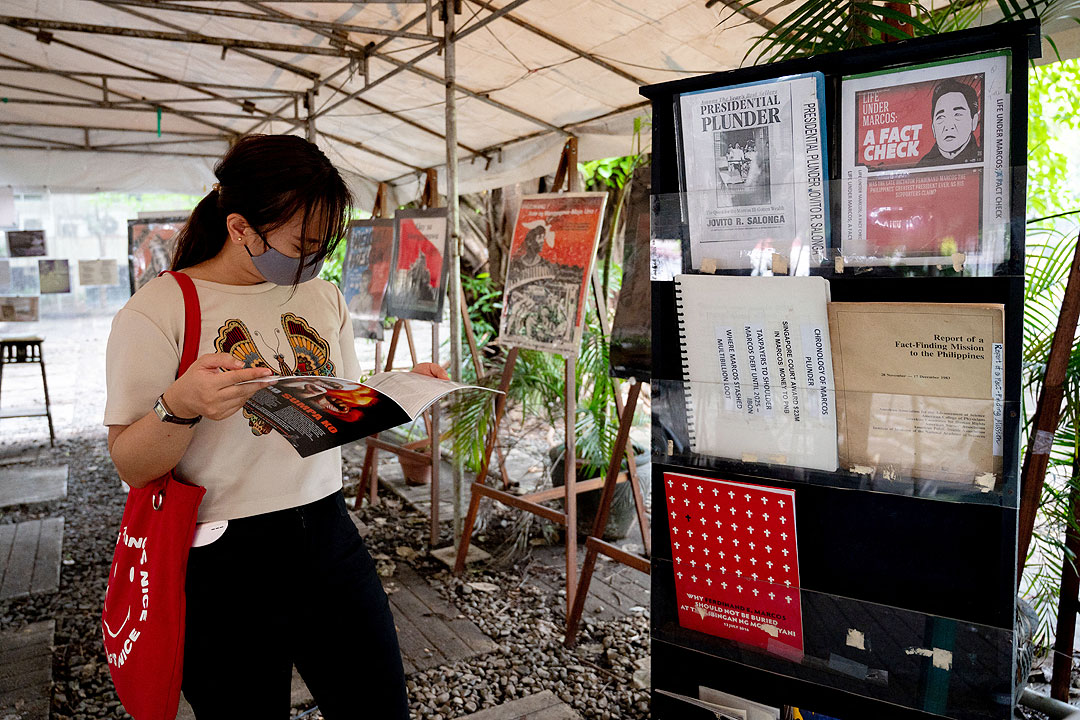Historians step up fight as Marcos returns to Palace

By Kyle Aristophere T. Atienza, Reporter
MARLON TOBIAS, 33, rushed to buy a book about the late dictator Ferdinand E. Marcos and his martial rule after his son and namesake won the presidential election by a landslide on May 9.
“Three days after the election, I rushed to buy the book The Conjugal Dictatorship of Ferdinand and Imelda Marcos because I was afraid that it might get banned by the incoming government,” the construction worker said in a Facebook Messenger chat.
Academics and historians said civil society and media will play key roles in preserving the country’s history on Martial Law under the presidency of Ferdinand “Bongbong” R. Marcos, Jr.
 “The collaboration between the academe, civil society organizations and the media is very important in these times,” said Ian Jason Hecita, who teaches political science at De La Salle University.
“The collaboration between the academe, civil society organizations and the media is very important in these times,” said Ian Jason Hecita, who teaches political science at De La Salle University.
He said civic organizations should lead the fight against disinformation, while strengthening partnership with the academe and media “in upholding knowledge and protecting facts.”
“They should amplify and popularize through social media the works of historians, sociologists and social scientists to counter the revisionist narrative,” Mr. Hecita said.
The younger Mr. Marcos in 2020 sought a revision of textbooks on his father’s martial rule, citing their propensity to paint his family as bad people.
His father on Sept. 23, 1972 announced on national television that he had placed the country under Martial Law, citing an alleged communist threat.
Proclamation 1081, which was dated two days earlier, abolished Congress and allowed him to consolidate power by extending his tenure beyond the two presidential terms allowed by the 1935 Constitution.
More than 70,000 people were jailed, about 34,000 were tortured and more than 3,000 people died under martial rule, according to Amnesty International.
Mr. Marcos ended Martial Law in January 1981, but it wasn’t until five years later that he was toppled by a popular street uprising that sent him and his family into exile in the United States.
Civic groups have said the truth about Martial Law is at risk of being further buried after Mr. Marcos chose incoming Vice-President Sara Duterte-Carpio, daughter of outgoing populist leader Rodrigo R. Duterte, as Education chief.
An official Presidential Palace website that stores historical records of Mr. Marcos’ Martial Law regime remained inaccessible as of June 12, or almost a month after the incident was first flagged on May 16. Books sanitizing the late dictator’s martial rule are also now being sold on Facebook.
“Our minds were poisoned for a long time by textbooks about the history of the Marcoses,” Jay-ar Castillo Dinglasan, one of the book’s sellers, said in a Facebook post. “Let’s not let this happen for the next generation.”
“While many Filipinos may have succumbed to this authoritarian nostalgia, there are many others who are pushing back,” said Jayeel S. Cornelio, director of the Development Studies Program at the Ateneo de Manila University.
“They are in the academe, media, religious sector, urban poor communities, we can go on and on,” he said in a Messenger chat. “Marcos Jr.’s victory will not erase our collective memory. Our history has shown us time and again that Filipinos have ingenious ways of subverting oppression.”
More than 1,000 Filipino scholars recently signed a manifesto expressing their commitment to fight what they see as efforts to distort history and sanitize the Marcos narrative, and oppose censorship of Martial Law truths.
This came after authorities tagged as communist a children’s book publishing house that sells five titles about Martial Law under a bundle called “#NeverAgain!” — the battle cry of thousands of Filipinos who joined a popular uprising that sent the Marcos into self-exile.
Carlos Quijon, Jr., an art historian and critic, expects more artists to join their cause to educate people about Martial Law and preserve memories of the dictatorship. He added that a number of collective endeavors against martial law disinformation were being planned.
“The strength of these collective endeavors is that these are composed of not just artists but also curators, writers and historians,” he said in a Messenger chat.
“The hope is for the histories surrounding Marcos’ dictatorship and Martial Law not only to be used as themes in artworks but also as material for more engaging public programs and historical research writing.”
“We must not forget that the task of rehabilitating the Marcos brand entailed the mobilization of a huge amount of capital to fund social media propaganda,” said Michael D. Pante, who teaches history at De La Salle University.
“It needed funding to pay multinational consultancy firms and hire an array of influencers to carry out a complex public relations project that stretched for years,” he said in a Messenger chat.
‘MESSIAH’
The analysts noted that among the things being used by some quarters to rebrand the former first family and discredit serious allegations against them is the government’s failure to collect their unpaid estate tax that has ballooned to more than P200 billion due to interests and other penalties.
“The Marcos camp has used precisely that failure to cast doubt on their accountability,” Mr. Cornelio said. “Marcos Jr. has mastered the art of evading his family’s accountability by simply questioning these claims and leaving it to the lawyers.”
“His supporters are then convinced that this is just another attempt to malign and discredit him,” he added.
Nestor T. Castro, who teaches anthropology at the University of the Philippines, said there’s a popular mindset among Filipinos that if someone’s not arrested or jailed for any wrongdoing, “then probably he or she is not guilty after all.”
“The same is true when someone gets imprisoned while on trial. “People believe that the person must be guilty,” he said in a Messenger chat.
Mr. Castro, 62, was among the thousands of activists and ordinary people imprisoned during Martial Law.
“I was imprisoned by Marcos in 1983 but a year later, the court cleared me,” he said. “I shared my experience on TikTok but many pro-Marcos apologists, or probably trolls, still judged me as guilty.”
Mr. Castro said the country’s weak justice system had allowed attempts to sanitize the Marcos family’s records.
“Many Filipinos will be influenced by the government’s actions and take it as what is legally accepted,” he said. “This is because many Filipinos are unfamiliar with the laws of the land.”
Mr. Cornelo, who has extensively published on religion in the Philippines, said the messianic theme in local politics and culture had allowed the return of the Marcoses to power.
“Marcos Jr. has always been presented as a messiah,” he said. “The discourses about him being the Tiger of the North and the one who will reclaim our greatness are all messianic.”
He said ordinary people might have likened Mr. Marcos’ election victory to the resurrection of Jesus Christ, who conquered death after being persecuted by the Jews.
“The Marcoses died, metaphorically speaking, and now they are coming back to life and many Filipinos are pinning their hopes on the son,” he said.
Mr. Cornelio noted that under a Marcos presidency, the future of Philippine politics and history would heavily depend on civil society.
“It all boils down to how brave and creative we can be,” he said. “My only hope is that we will learn to navigate the next six years to raise a new generation of Filipinos who will not only honor our history but also demand accountability.”
Liza L. Maza, a Martial Law survivor, said the fight against historical revisionism heavily relies on the young generation.
“The youth should be at the forefront of the struggle against historical revisionism,” she said in a Messenger chat. “They have much energy and mobility, as well as skills in information technology to fight disinformation.”
The fight for the truth continues, she said. “It’s not enough that we change the leaders. We should change the system.”
Mr. Tobias, the building worker, said he would share his Martial Law book with others. “Just to prevent the distortion of history and other disinformation attempts, I am willing to lend my book for free.”



